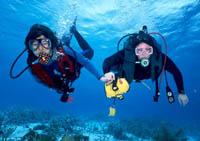Help the divers

With the exception of sharks, the highest risk for divers is the change in pressure. When coming out too quickly from the depth of the sea, the pressure decreases and air bubbles form in the blood. Depending on the quantity of air, the effects can be very varied, such as superficial tears, paralysis or death. It is called decompression mal.
A device that studies blood gas has been developed in Scotland. Through this small meter, which the diver can carry on the wrist, you can know when it is emerging too fast. So far, the only way to detect decompression problems was through an ultrasound system that should be used from the surface of the water. To launch this system, it is essential to calibrate the ultrasound with blood samples prior to submarine immersion. These reference systems present precision problems.
The wrist meter has been developed by scientist Bobby Forbes of Hilt-Watt University in the Orkney Islands. It detects air bubbles by ultrasound but without prior calibration. In addition, the device records the activity of the submarine continuously.
According to the author, the case of decompression can be very reduced and can also serve for the training of experienced divers.
Published in the newspaper
Buletina
Bidali zure helbide elektronikoa eta jaso asteroko buletina zure sarrera-ontzian








